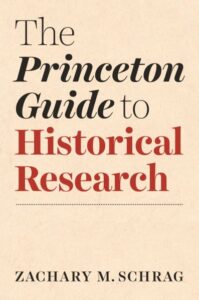 While I’ve long been interested in history, over the past half decade or so I’ve found myself devoting an increasingly greater portion of my reading time to books that would be classifiable under that general subject heading. And in so doing, I have discovered that a valuable skill to have when reading books of history is to understand how research in the field of history is performed as it can uncover – or at least present possibilities – important to the topic being presented that may not be included in the literal text of the work but that nevertheless are relevant to what is presented in it. The challenge of acquiring such skills, however, is too often thought by many to be perhaps too arcane for the general reader to learn, being only appropriate for study by those seeking to perform historical research professionally.
While I’ve long been interested in history, over the past half decade or so I’ve found myself devoting an increasingly greater portion of my reading time to books that would be classifiable under that general subject heading. And in so doing, I have discovered that a valuable skill to have when reading books of history is to understand how research in the field of history is performed as it can uncover – or at least present possibilities – important to the topic being presented that may not be included in the literal text of the work but that nevertheless are relevant to what is presented in it. The challenge of acquiring such skills, however, is too often thought by many to be perhaps too arcane for the general reader to learn, being only appropriate for study by those seeking to perform historical research professionally.
Against this incorrect – so say I – assumption of the methods of historical research being exclusive to professionals and beyond the ken of the interested reader of history, I set Prof. Zachary Schrag’s recently published book The Princeton Guide to Historical Research. Presented in a clearly-written step-by-step manner that begins with a fundamental skill that applies to far more than just the study of history – how to ask good questions – Prof. Schrag then moves through the process of defining research topics, how to use archives and libraries, locating sources, how to read materials critically and extract useful information from them, documentation, presenting claims that are supported by evidence (I can’t sufficiently stress how this skill alone should be learned by everyone who would consider him or herself intelligent, educated, and well-informed in our presently blighted “fact free” age), and – perhaps among the most important skills of all, telling compelling stories. As can be easily understood from all these things, this is a book that is clearly not only indispensable to historians, but would be well worth the time to read by a wide range of people far beyond both historians and readers of history.
The Princeton Guide to Historical Research is published as a part of the Press’ Skills for Scholars series. If you have not yet discovered this series of very interesting and useful books, I highly recommend that you take a little time and explore what it has to offer.
Nota bene: to those who would be interested in hearing Prof. Schrag discuss this book himself, he sat for an interview with Caleb Zakarin that is available via podcast thanks to the New Books Network / Princeton University Press Ideas partnership.
